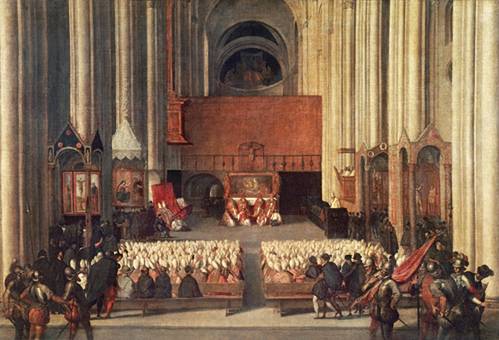Music and the Counter Reformation

The Council of Trent
To respond to the influence of Protestantism with its emphasis on unmediated, individual devotion, the Roman Catholic curia convened the many sessions which together are known as the Council of Trent. In the context of reforming the liturgy, the church laid down precepts governing how music should be conceived and set. While reflecting the views of St. Augustine who felt that the beautiful sound of music could overwhelm contemplation of the meaning of the text, the reforms were also influenced by the humanist perspective on the power inherent in text. Bishop Cirillo Franco in a letter of 1549 stated the problems of the old style:
I should like, in short, when a Mass is to be sung in church, that its music be framed according to the fundamental subject of the words, in harmonies and rhythms apt to move our affections to religion and piety, and likewise in Psalms, Hymns, and other praises that are offered to God.....
In our times they have put all their industry and effort into the composition of fugues, [a technique of imitation] so that while one voice says, "Sanctus" another says "Sabaoth," still another "Gloria Tua" with howling, bellowing and stammering, so that they more nearly resemble cats in January than flowers in May.
Finally, the Church laid down the law in a late session of the Council of Trent. The following comes from the canon of 10 September 1562.
All things should indeed be so ordered that the Masses, whether they be celebrated with or without singing, may reach tranquilly into the ears and hearts of those who hear them, when everything is executed clearly and at the right speed. In the case of those Masses which are celebrated with singing and with organ, let nothing profane be intermingled, but only hymns and divine praises. The whole plan of singing in musical modes should be constituted not to give empty pleasure to the ear, but in such a way that the words may be clearly understood by all, and thus the hearts of listeners be drawn to the desire of heavenly harmonies, in the contemplation of the joys of the blessed. They shall also banish from church all music that contains, whether in the singing or in the organ playing, things that are lascivious or impure.
in Weiss/Taruskin, Music in the Western World: A history in Documents 135 - 137.
Index
All text © Todd Tarantino 2002-2012.
Not to be reprinted without permission.
www.toddtarantino.com
Contact

